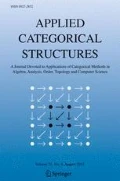Abstract
Synthetic Domain Theory provides a setting for denotational semantics following Dana Scott's slogan ‘domains as sets’ in which all functions are continuous. Several approaches can be found in the literature, but they are either model-dependent or if they use an axiomatic setting then not uniformly and not explicitly. We present a completely logical approach to Synthetic Domain Theory (SDT), axiomatizing (complete) Extensional PERs. On these grounds some basic domain theory is developed. Special attention is devoted to admissibility. The axiomatic approach is advantageous since it allows for easy formalization and comparison to other axiomatic settings.
The consistency of the theory is shown by providing an appropriate realizability model. It is discussed how to get from this ‘special kind’ of SDT ‘{à la Scott}’ to a more general form which unifies several approaches.
Similar content being viewed by others
References
Crole, R. L. and Pitts, A. M.: New foundations for fixpoint computations: Fix-hyperdoctrines and the fix-logic, Inform. and Comput. 98 (1992), 171–210.
Cutland, N.: Computability — An Introduction to Recursive Function Theory, Cambridge University Press, 1980.
Freyd, P., Mulry, P., Rosolini, G., and Scott, D.: Extensional PERs, Inform. and Comput. 98 (1992), 211–227.
Fiore, M. P. and Plotkin, G. D.: An axiomatisation of computationally adequate domain theoretic models of FPC, in 9th Logic in Computer Science, IEEE Computer Soc. Press, Washington, 1994, pp. 92–102.
Fiore, M. and Rosolini, G.: Two models of synthetic domain theory, Journ. Pure and Appl. Alg. 116 (1996), 151–162.
Freyd, P.: Algebraically complete categories, in A. Carboni, M. C. Pedicchio, and G. Rosolini (eds.), Proceedings of the 1990 Como Category Theory Conference, Lecture Notes in Mathematics 1488, Springer, Berlin, 1991, pp. 95–104.
Hyland, J. M. E.: First steps in synthetic domain theory, in A. Carboni, M. C. Pedicchio, and G. Rosolini (eds.), Proceedings of the 1990 Como Category Theory Conference, Lecture Notes in Mathematics 1488, Springer, Berlin, 1991, pp. 131–156.
Longo, G. and Moggi, E.: Constructive natural deduction and its ‘ω-set’ interpretation, Math. Structures in Computer Science 1 (1991).
Longley, J. R.: Realizability toposes and language semantics, PhD Thesis, University of Edinburgh, 1994.
Luo, Z. and Pollack, R.: Lego proof development system: User's manual, Technical Report ECS-LFCS–92–211, Edinburgh University, 1992.
Longley, J. R. and Simpson, A. K.: A uniform account of domain theory in realizability models, Math. Structures in Computer Science 7(5) (1997), 453–468.
Luo, Z.: Computation and Reasoning — A Type Theory for Computer Science, Vol. 11 of Monographs on Computer Science, Oxford University Press, 1994.
Paulson, L. C.: Logic and Computation, Vol. 2 of Cambridge Tracts in Theoretical Computer Science, Cambridge University Press, 1987.
Phoa, W. K.: Domain theory in realizability toposes, PhD Thesis, University of Cambridge, 1990. Also available as report ECS-LFCS–91–171, University of Edinburgh.
Phoa, W. K.: An introduction to fibration, topos theory and the effective topos and modest sets, Technical Report ECS-LFCS–92–208, Edinburgh University, 1992.
Reus, B.: Program verification in synthetic domain theory, PhD Thesis, Ludwig-Maximilians-Universität, München, 1995, Shaker Verlag, Aachen, 1996.
Reus, B.: Synthetic domain theory in type theory: Another logic of computable functions, in J. G. Joakim von Wright and J. Harrison (eds.), Theorem Proving in Higher Order Logics: 9th International Conference, TPHOLs'96, Lecture Notes in Computer Science, 1125, Springer, 1996, pp. 363–381.
Rosolini, G.: Continuity and effectiveness in topoi, PhD Thesis, University of Oxford, 1986.
Rosolini, G.: Notes on synthetic domain theory, Draft, August 1995.
Reus, B. and Streicher, T.: Naive synthetic domain theory — a logical approach, Draft, September 1993.
Reus, B. and Streicher, T.: General synthetic domain theory — a logical approach (extended abstract), in E. Moggi and G. Rosolini (eds.), 7th Conf. Category Theory in Computer Science, Lecture Notes in Computer Science 1290, Springer, Berlin, 1997, pp. 293–313.
Simpson, A. K.: Private communication, June 1995.
Simpson, A. K.: Domain theory in intuitionistic set theory, Draft, 1996.
Streicher, T.: Semantics of Type Theory, Correctness, Completeness and Independence Results, Birkhäuser, 1991.
Streicher, Th.: Inductive definition of repletion, this volume.
Taylor, P.: The fixed point property in synthetic domain theory, in 6th Symp. on Logic in Computer Science, IEEE Computer Soc. Press, Washington, 1991, pp. 152–160.
Author information
Authors and Affiliations
Rights and permissions
About this article
Cite this article
Reus, B. Extensional Σ-Spaces in Type Theory. Applied Categorical Structures 7, 159–183 (1999). https://doi.org/10.1023/A:1008600521659
Issue Date:
DOI: https://doi.org/10.1023/A:1008600521659




